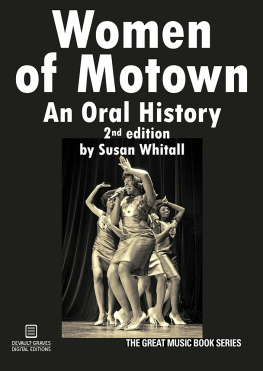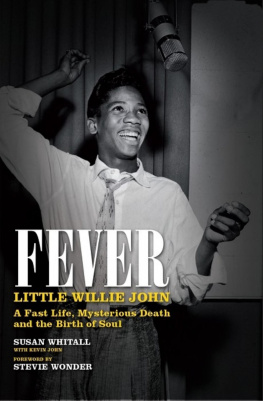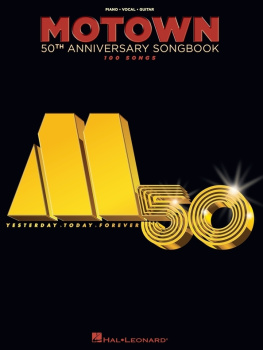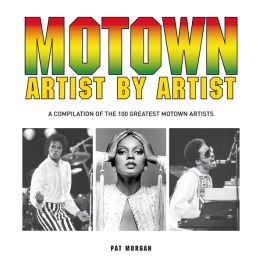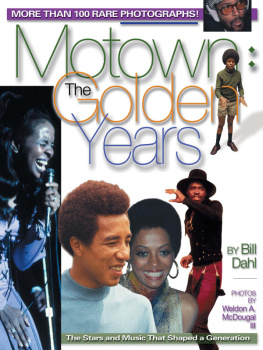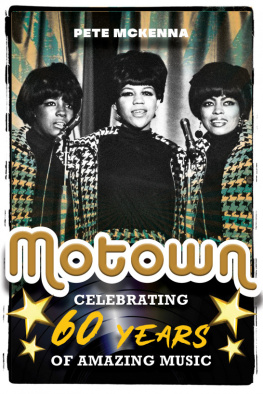
DEVAULT-GRAVES DIGITAL EDITIONS
An imprint of The Devault-Graves Agency, LLC
2197 Cowden Ave.
Memphis, Tennessee 38104
Women of Motown: An Oral History (Second Edition) copyright 2017 by Susan Whitall. The first edition of Women of Motown: An Oral History was published by Avon Books, 1998, copyright 1998 by Susan Whitall.
All rights reserved. No part of this publication may be reproduced, stored in a retrieval system, or transmitted in any form or by any means, electronic, mechanical, photocopying, microfilming, recording, or otherwise, without permission of the publisher.
Print Edition ISBN: 978-1-942531-26-5
Ebook ISBN: 978-1-942531-27-2
Cover design: Martina Voriskova
Title page design: Martina Voriskova
Photos: All photos are courtesy of
Motown Records unless otherwise credited.
Cover photo: Cast members of Mosaic Youth Theatre
of Detriot portraying the Marvelettes in the play
Now That I Can Dance - Motown 1962

Introduction
FOR THE FIRST TEN years after Berry Gordy Jr. started Motown in 1959, the companys history was a mystery enclosed in an enigma, held as tightly by the company and its roster as if theyd been working on a national defense project, rather than making great music. But from the 1980s on there was an explosion of ink; tell-all books about Diana Ross and Michael Jackson, a tell-not-so-much tome by Ross herself; various biographies and autobiographies about the Temptations, Smokey Robinson, and Marvin Gaye. Even the chairman himself, Gordy, finally wrote his autobiography, To Be Loved, in 1994.
But Motown was never about one star group or one star singer, producer, or musician. It wasnt even just about Berry Gordy and his Motown-affiliated siblings. The two-story house at 2648 W. Grand Blvd. in Detroit was bursting with music, and the labels strength was its depth of talent and a competitive atmosphere nurtured by the paternal Gordy.
Songwriter/producers such as Norman Whitfield, Holland-Dozier-Holland, Brianbert (Brian Holland and Robert Bateman), and Smokey Robinson could take obscure teenagers and make recording stars out of them. And the house band, the Funk Brothers, created musical textures and rhythms that helped give the records those irresistible, enduring hooks.
When I was covering music for TheDetroit News in the 1980s, I quickly discovered that although the label had moved its headquarters to Los Angeles in 1970-72, there were still a lot of Motown stories to cover.
One rainy day in November 1987 I was running late on my way to cover the official dedication of a state of Michigan historical marker outside the house on West Grand Boulevard. The governor of Michigan, the mayor of Detroit, Motown vice president Smokey Robinson, and assorted muckety-mucks were on hand for the ceremony, held outside, despite a sleety downpour. Several blocks around the house had been blocked off by police, but I had to get in to cover the event for a front page story. After circling the block, I flashed a press card to a police officer that declared that I was empowered to cross all police and fire lines. This drew a round of laughter from the cops, and no parking spot. So I ended up ditching my car many blocks away and ran madly in the direction of the Motown house.
Once I made it to Hitsvilles improbably hilly front lawn, my troubles werent over. Somehow, I wasnt on the press or VIP list, so I waited out in the rain while a consultation went on. I was now beyond wet, so when a tall man standing on the porch asked if I was going to Motowns after-party at the St. Regis Hotel, I huffed, I dont care if I ever come back here!
Dont say that! Youre just wet! the kindly man said. When you come in and dry off, youll feel better. He went in and made some noise with the powers-that-be; I vaulted over the porch railing and ventured in. I peered at my tall benefactor. Youre Marv Johnson, I said.
He was indeed. And as the singer of Come T o Me, he was truly one of the pillars of early Motown.
Marvs song Come To Me had been released initially on Tamla, then leased to United Artists. It became a national hit in 1959, generating money for Berry Gordy at a time when he badly needed it. Marvs follow-up, You Got What It Takes was another classic.
But sadly, like many early Motown stars, by the late eighties, when I met him, Marvs star had faded. He was living a spartan existence in a rented room in Detroit, left behind when the label moved west, and all but forgotten. But he still had a twinkle in his eye, and his kindness to me led to several talks. He was full of information and stories, and I meant to take them all down. I lost my chance when he died just a few years later.
I saw too many Motown greats pass on like that: artists and musicians whose talent and hit records initially surpassed that of labelmates such as the Supremes, but were left on the scrap heap of fame when their hits slowed down.
Whether this happened because theyd lost favor with the boss, or whether they had unrealistic expectations that the Motown family would take care of them forever, is not mine to judge.
Its a pleasure just to be able to document the story of groups like the Marvelettes, one of the key acts in Motowns history, and too often forgotten. If I cant help Marv Johnson tell his story, at least I can preserve the stories of those I have interviewed.
The women of Motown are a particularly fascinating lot. Growing up, Berry Gordy was surrounded by many capable women, from his mother, businesswoman Bertha Gordy a formidable force who helped mentor singer Mable John to the four Gordy sisters: Loucye, Anna, Esther, and Gwen.
During Motowns heyday, female artists were still ghettoized A&R director Mickey Stevenson admits the label couldnt release too many girl group records at once, because radio would only play so many but Gordy designed Motown as the sort of place that encouraged talent, no matter the gender. The boss was as ready for female songwriters such as Janie Bradford or Sylvia Moy to hand him hit tunes as anybody.
And of course, among the most enduring images we relate to Motown are that of the girl groups, and of the classic Motown diva.
As many of us grew up, infant notions of feminine glamor were nurtured by the satiny black and white glossies of Brenda Holloway and Tammi Terrell we saw; puberty was nudged along for countless boys by the sight of Mary Wells on an album cover wearing those snug gold lam capri pants.
The women of Motown tell their stories here roughly in the order that I believe they came into contact with Berry Gordy the founder, chairman, and heart and soul of Motown. Some tell their story as a chronology; others, bless em, are more stream-of-consciousness types. I tried to preserve their voices, whatever their style.
There are sad stories to be told by and about the women of Motown, but there are many more inspiring tales, because the ones who survived are a feisty lot. I wouldnt dare take a can of hairspray from any one of them, not on your life
Susan Whitall
The Voices
[In Order of Appearance]
Mable John
Mable, the elder sister of legendary R&B singer Little Willie John, learned business skills from Berry Gordys busy mother, Bertha. She then used that knowledge to help Gordy as an assistant as he assembled his Motown empire. As a singer, Mable benefited from Gordys musical coaching, and she ended up performing at some of Detroits best nightclubs. She was the first solo female to record for Motown Records.
Next page
